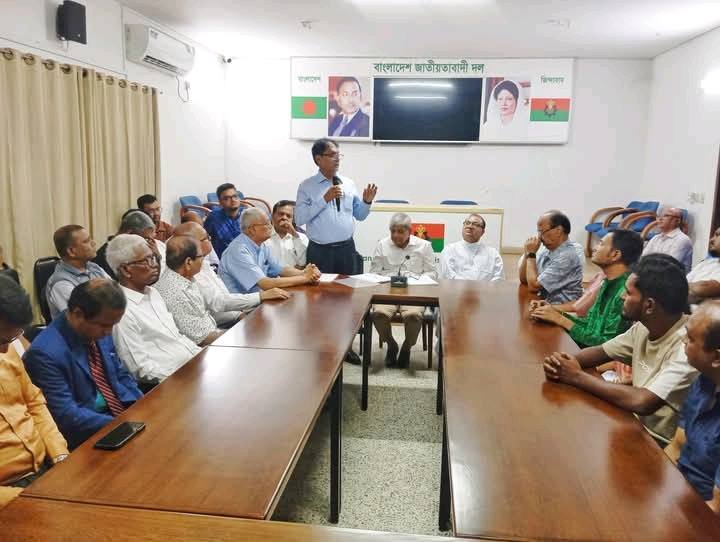Bangladeshi Christians call for representation in the 2026 elections
A group of Christian community leaders met with the Bangladesh Nationalist Party (BNP) - widely favoured with the exclusion of the Awami League - calling for inclusive and fair lists. Secretary Alamgir reassures them about a ‘non-sectarian’ country and reforms to protect minorities. Civil society calls for reserved seats for indigenous communities and gender parity. The European Union pledges €4 million for a transparent democratic process.
Dhaka (AsiaNews) - As Bangladesh prepares for national elections scheduled for early 2026, civil society leaders and minority groups are urging political parties to ensure that the polls are inclusive, fair and credible internationally.
Among them, Christian leaders recently met with Mirza Fakhrul Islam Alamgir, secretary general of the Bangladesh Nationalist Party (BNP) - the party of Khaleda Zia and Tariqeu Rahman, widely favoured - with the exclusion from the polls of former Prime Minister Sheickh Hasina's Awami League - to urge representation and recognition of their community's demands.
The meeting, held at the BNP presidential office in Gulshan on 13 October, was attended by representatives of the Bangladesh Christian Forum. Fakhrul reiterated the BNP's commitment to building a Bangladesh without divisions, stating: ‘We all believe that Bangladesh is a non-sectarian country and we want to cultivate and strengthen this ideal as a nation.’
Christian leaders expressed their desire to see candidates from their community included on the BNP's electoral lists and their issues reflected in the party's manifesto. They stressed that without political representation, their voices remain unheard in the national decision-making process.
This call for inclusivity was reiterated on 27 October in Dhaka during a roundtable discussion entitled ‘Inclusive and Fair National Parliamentary Elections: Civil Society Expectations of Political Parties,’ organised by ActionAid Bangladesh's Sushil project and Prothom Alo, with the support of the European Union. The event brought together leaders from various political parties, civil society organisations and minority groups.
Sanjeeb Drong, a Catholic and secretary general of the Bangladesh Indigenous Forum, highlighted the structural barriers faced by indigenous communities. ‘It is not possible for any indigenous person to win elections for numerical reasons,’ he said, arguing for the need to reserve seats in parliament. He therefore urged parties to commit to indigenous community rights, employment, land ownership and cultural diversity in their election manifestos.
Salahuddin Ahmed, a member of the BNP Standing Committee, speaking at the roundtable, acknowledged the limitations of the past and promised broader reforms if the BNP returns to power. ‘We will welcome various proposals from people of all classes and professions,’ he said.
He also emphasised the need for judicial independence, media freedom and voter empowerment: ‘The role of voters will be primary, while law enforcement will be secondary.’ He also assured that the BNP will strive to ensure the representation of ethnic groups, tribes, religions and castes in the formation of parliament and will consider making secondary education free based on financial capacity.
Nayeb Ameer Syed Abdullah Mohammad Taher, a member of the Islamist Jamaat-e-Islami party, who was also present at the round table, stressed the importance of political parties and the government's television commitments to ensuring fair elections.
He warned that if the elections are not conducted fairly, they should be cancelled and rescheduled. Taher lamented the lack of fair voting over the past fifty years, attributing the country's stagnation to this.
‘All parties must abide by the electoral code of conduct,’ he said, adding that the sincerity of political parties and the impartiality of the administration are crucial for credible elections.
Akhtar Hossain of the National Citizens' Party (NCP) emphasised the need for peaceful transitions of power and criticised the failure to respect direct elections for female candidates. ‘We have discussed this at length, but the system has hindered the process,’ he said, reiterating the NCP's commitment to women's empowerment.
Educator Rasheda K. Chowdhury also warned that without political will, women will continue to be marginalised. ‘Money and muscle have always pushed women to the sidelines in elections,’ she said.
The European Union, which has allocated £3.5 million to support credible elections in Bangladesh, reiterated its support for civil society engagement and voter education. As the elections approach, Bangladesh's Christian community and other marginalised groups are stepping up their demands for representation, transparency and reform, in the hope that their voices can shape the nation's future.
11/08/2017 20:05







.png)










